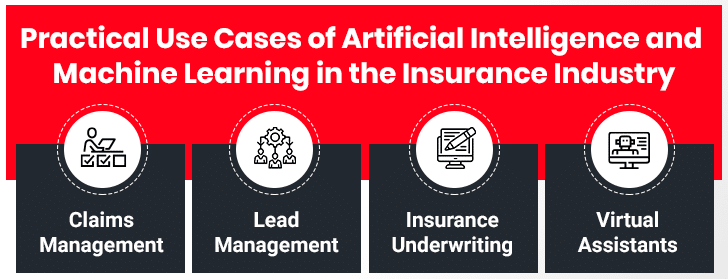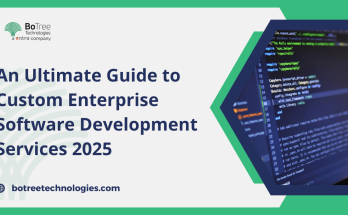The potentiality of artificial intelligence (AI) and machine learning (ML) is driving significant digital change across many industries, including insurance.
As per a report by Accenture, AI can completely transform the $1.1 trillion insurance sector. Improved client experiences, operational effectiveness, and higher profitability are expected to produce this value.
The way insurers conduct business is being revolutionized by these technologies, which allow them to improve consumer experiences, speed up procedures, and improve risk management.
What Function Will AI Play in the Insurance Sector in the Future?
Businesses in this sector face a variety of difficulties. It’s a very competitive market, especially now that consumers can compare businesses online with simplicity.
Unfortunately, it went through years of underinvestment in the adoption of AI technologies. As insurance firms come to understand the key advantages of AI, they will build on those previous use cases and discover new ways to improve consumer experiences.
The frustrating insurance experience for clients has the potential to be replaced with something quick, convenient, and reasonably priced.
We will soon start to see more adaptable insurance since insurers can better grasp what their consumers want and need if they use AI services for the vast amounts of data they are sitting on.
Additionally, AI will make it simpler for clients to communicate with insurance providers, increasing the likelihood that they will make a purchase.

Source: damcogroup
How will AI and ML Transform the Insurance Industry?
Since the insurance sector has long relied heavily on data, AI and ML technologies are now uniquely positioned to significantly impact the sector. So let’s discuss how AI and ML might assist the insurance sector change.
- Complete Customer Support Services
- AI can offer smooth solutions for boring logistical processes, from helping clients choose the ideal insurance policy that fits their needs to processing and addressing customer complaints.
- AI solutions can use deep learning and neural networks to analyze consumer profiles and needs before recommending the best policies. By reducing the requirement for consulting, such changes not only save time but also money.
- Reputable insurance providers have already used AI Chatbots for claim processing on their websites to handle general concerns and answer questions from customers.
- Effective Transaction Management and Claims Processing
- AI services may automate benefit transactions and speed up the processing of insurance policy claims. To further streamline the processing of claims without human involvement, it can also control the complex details of a policy.
- As a result, clearing claims submissions takes much less time, freeing up a business to concentrate on raising the quality of its services.
- Fraud Detection and Prevention
- By analyzing prior claims reports and rapidly picking up on fraud, AI services can help reduce false claims. The insurance sector has always faced great difficulty due to fraudulent claims.
- There are so many times when fraud occurs that the business loses $40 billion annually to insurance fraud.
- Fraud prevention can benefit greatly from predictive analytics. For example, AI can help reduce false claims by analyzing prior claims reports and quickly picking up on fraud. Thus, businesses can fight fraud quickly and successfully.
- Pricing and Optimization of Policy
- The traditional method of pricing insurance policies, where insurers group consumers based on established standards after deducing certain specifications, may be replaced by AI.
- Predictive analytics in underwriting would enable artificial intelligence solutions to tailor policy plans to meet the needs of individual customers.
- Additionally, artificial intelligence services might create insights into client preferences, price, and behavioral indications before presenting a list of other pertinent, flexible aspects that depend on the state of the market and related dangers. Then, insurers might apply these techniques to further tailor policy compensation.
- Cognitive Technological Developments
- Convolutional neural networks (CNN) and other broad-based AI services will soon support the processing and structuring of complex datasets thanks to emerging standards.
- Also, new datasets will be continuously produced as insurance applications that have just been filed are processed. These developments will help InsurTech Companies develop new product categories and consumer interaction initiatives.
AI Technology Implementation in the Insurance Industry
Automation and deep learning are two technical developments whose importance can be seen in the speed with which various sectors worldwide have adopted them.
The insurance sector must take the initiative to support and create space for AI to keep up with the adoption of AI technologies.
- Developing and Applying a Comprehensive Data Strategy
- Data management strategies must be comprehensive as the foundation of the insurance industry’s operation. We can use AI in insurance to group the data into recognizable coefficients to balance internal and external data.
- AI solutions would also be very helpful in risk assessment, enhancing customer satisfaction, and streamlining the underwriting procedure. The only genuinely difficult part of its deployment would be to make this procedure affordable.
- Building an Appropriate Technology Infrastructure
- Developing workers with the required technical skills are equally important for maximizing the potential of AI technology. Therefore, we need applicants with exceptional skills for data engineers, data scientists, and cloud computing professionals.
- In contrast to employing conventional methods, we may produce remarkable results by combining such skill sets with AI technologies, like UX design with AI.
- As a result, insurtech Companies must make focused investments in this area to modernize their AI technology stack and enforce a modern view.
- Extensive Research into AI Technologies
- The insurance sector has experienced an important change due to the rise of AI and the technologies that fall under it. It will take a lot of research to figure out which functions could be automated or integrated with AI in insurance.
- Convolutional neural networks might analyze and categorize vast policy datasets to produce definitive answers. Deep learning technologies could be integrated into the behavioral analysis of policyholders.
- Also, these AI-based technologies might streamline transactions, automate the processing of insurance claims, and help maintain records.
Therefore, it is advised that the industry perform thorough research on enhancing the current AI technology stack to ensure that it aligns with businesses’ needs before investing.
Creating and Implementing a Successful Business Strategy
An insurance company’s market capitalization would increase if it developed a thorough business plan for implementing AI technologies. It would also improve branding, product design, and customer engagement.
The insurance sector should include artificial intelligence technologies in its business strategy to acquire market insights and fully identify the risks and opportunities to consider.
The insurance sector might then utilize the collected data in far more effective ways to further form strategic strategies for the sector.
“Are you prepared to fully utilize AI’s primary benefits for your company? Contact an enterprise software development company such as BoTree Technologies, to set up a consultation right away. Let our knowledgeable experts comprehend your company’s requirements and show you how our cutting-edge Machine Learning solutions can produce visible outcomes.”
Final Words
The insurance sector is changing because AI and ML are increasing productivity, enhancing client experiences, reducing risks, and revealing insightful data.
Insurtech Companies may position themselves for long-term success in a market that is becoming more aggressive by utilizing the power of these technologies.
For insurers to satisfy shifting client expectations and negotiate the complexity of a constantly changing environment, seamless integration of human expertise and artificial intelligence is essential to the future of insurance.
Know more about the extensive range of machine learning services BoTree Technologies – A software development company, offers to take your business to new heights. Our products address a range of business demands, from data analysis and predictive modeling to AI-powered natural language processing and computer vision. Look through our portfolio to find the ideal fit for your company. Explore our machine learning services now to take control of your digital transformation.
Contact the engineers at BoTree Technologies today to learn more.



